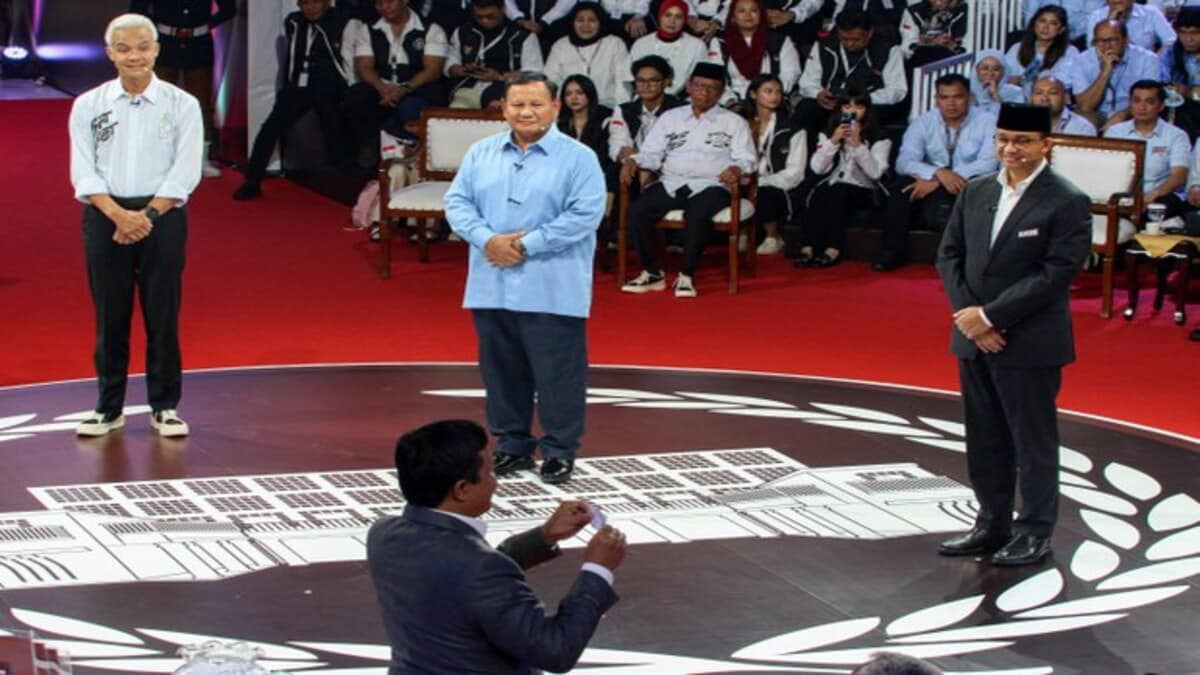In a heated televised debate on Tuesday, 12th December Indonesia’s three presidential candidates sparred over policy pledges, achievements, and past controversies, setting the tone for the upcoming elections on February 14. The first of five debates covered crucial issues such as law, human rights, corruption eradication, governance, public service improvement, strengthening democracy, tackling disinformation, and managing civic harmony.
Former Jakarta governor Anies Baswedan, along with running mate Muhaimin Iskandar, confronted Defense Minister Prabowo Subianto and his running mate, Gibran Rakabuming Raka. Ganjar Pranowo and Mahfud MD, the third pair in contention, added to the intensity of the debate.
The exchanges became particularly intense as candidates questioned each other’s past actions and decisions. Anies challenged Prabowo on ethics, indirectly referring to Gibran’s eligibility controversy, while Prabowo defended the decision, stating that it was lawful. The audience cheered as Anies insisted on the importance of meritocracy and criticized the reliance on connections.
In a crossfire of accusations, Prabowo questioned Anies about the air pollution problem in Jakarta during his tenure as governor. Anies defended himself, attributing the issue to factors beyond the city’s control and emphasizing the use of data in his decision-making.
Ganjar, the former Central Java governor, pressed Anies on his stance regarding relocating the capital to Nusantara in eastern Kalimantan. Anies, in response, diverted the focus to more pressing needs, such as rebuilding schools and constructing highways.
Human rights issues took centre stage as Ganjar confronted Prabowo about forming a human rights court and locating the graves of disappeared activists. Prabowo, accused in the past of human rights violations, avoided a direct answer, emphasizing the recurring nature of the issue in previous elections.
The debate concluded with candidates criticizing each other’s records, with Prabowo targeting Ganjar for a fertiliser shortage during his term as Central Java governor. Ganjar defended himself, attributing the shortage to data-related challenges affecting multiple provinces.
The supporters of each camp were vocal, applauding and cheering throughout the event. While the candidates shook hands and hugged after the debate, the intense exchanges set the stage for a competitive election.
In the opening statements, Anies pledged to uphold the law, Prabowo highlighted Indonesia’s overall stability, and Ganjar emphasized the importance of a clean government, promising to address health facilities and provide free internet for students.
The upcoming debates will delve into economic issues, defence, security, geopolitics, international relations, energy, environment, and information technology before the election takes place on February 14. With 204.8 million eligible voters, this election marks the first time in 15 years that three pairs are competing for Indonesia’s top leadership positions, as President Joko Widodo is ineligible for re-election. Front-runners Prabowo and Gibran hold an electability rating of over 40%, with Ganjar and Anies in tight competition for a potential second round in June.

